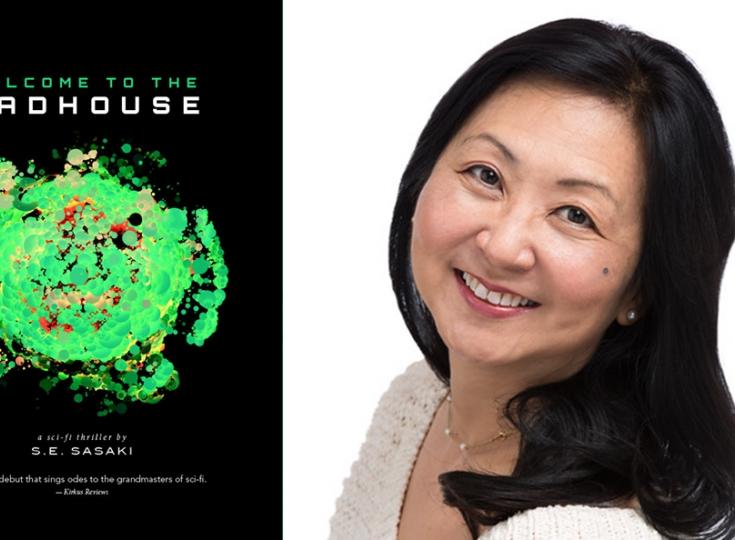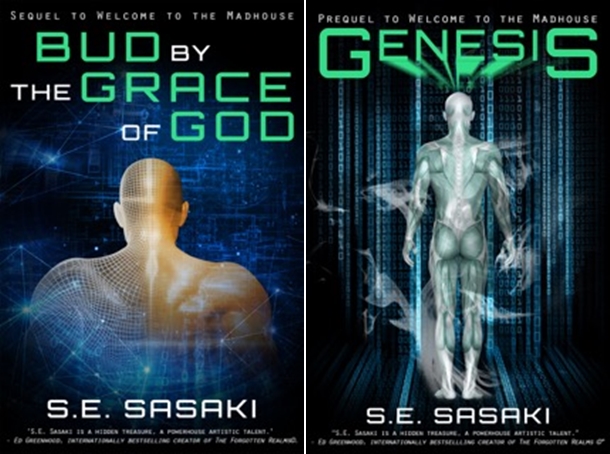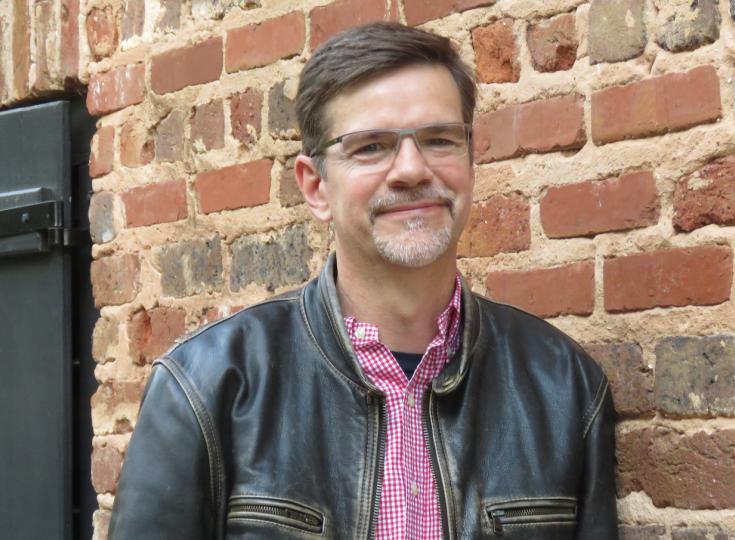S.E. Sasaki - Medical Sci-Fi Thrillers With a Lot of Humor

S.E. Sasaki writes intriguing medical sci-fi thrillers that will make you laugh and make you think. As a surgical assistant, she writes what she knows, but she also likes to explore the future of medicine and the possible moral dilemmas it might bring. As our Author of The Day, Sasaki reveals why she enjoys writing sci-fi, talks about her dragon paper collages and discusses her novel, Welcome to the Madhouse.
Please give us a short introduction to what Welcome to the Madhouse is about
Welcome to the Madhouse is a science fiction suspense thriller that takes place on a medical space station. It has a touch of romance, a lot of humour, and a number of moral dilemmas to ponder. The main character, Dr. Grace Lord, is a surgeon who thinks she has landed the job of her dreams training under the galaxy-renowned Dr. Hiro Al-Fadi. She is learning to repair wounded, genetically modified, animal-adapted space marines who suffer trauma from conflicts the Conglomerate is involved in. Attacked by patients, stalked by strange androids, harangued by her supervisor, and romantically pursued by an alluring psychiatrist, Grace thinks she has her hands full. Then a mysterious ship docks at the station and the dying starts...
Why did you pick a medical space station as the backdrop for your story?
I am a surgical assistant. I work in the operating room doing emergency surgery and elective cases. The medical space station allows me to focus on medical questions and medical ethics but I can extrapolate situations into the future, transporting the reader to a new world. The themes I focus on are actually present day questions that I want people to think about such as war, prejudice, discrimination, the search for immortality, genetic modification, or the creation of artificial intelligence. If I get people thinking, I have done what I set out to do.
Why do you write sci-fi? What is it about the genre that you enjoy?
I started reading science fiction at age seven with Madeleine L’Engle’s A Wrinkle in Time and was hooked. I loved the idea that the shortest distance between two points was not a straight line but a ‘wrinkle', a tesseract. What I love about science fiction is what one can do with it. Introduce new ideas or technologies, question what is happening in today’s world, create a new world or universe, tell a great tale without the constrictions of our present day societal morals or rules. Science fiction asks the questions: What if...? What happens if we do…? What happens if we don’t…? Science fiction can be our Social Conscience. H.G. Wells novel, The Time Machine, was about the separation between the upper and lower classes. His War of the Worlds was about colonialism. Joe Haldeman’s Forever War was an antiwar novel. George Orwell’s 1984 was about government interference and Big Brother interfering in our lives. Neill Blomkamp's movie, District Nine, was about apartheid. Science fiction allows one to step out of the present world and really focus on an issue through extrapolation, exaggeration, and imagination.
What inspired the concept of humans that are genetically altered with animal upgrades?
I was thinking about how scientists could use genetic manipulation to improve the human body. But rather than invent the coding all from scratch, it made more sense to borrow the genetic information from what Nature had already perfected in other animals, such as the most successful predators on the planet - lions, tigers, wolves, bears, etc.
You also address big ideas philosophically, like the possibility of one mind using up multiple bodies. Why did you take this approach?
The reason I write science fiction is to ask the big philosophical, moral questions. That is my goal. What does it mean to be human? Should we really pursue extended life? What is the down side of living forever? What are the dangers of such technology? How will it be misused? Would you want a leader like Trump to have the ability to live forever? As a physician, we face moral questions more than most. In the instance of a plague, such as the Al-Fadi virus from my book, one has to isolate the potential carriers and take away their freedom to escape, in order to prevent the spread of the disease. Makes sense if you are not the quarantined. It can mean death for those quarantined. Is this fair? Should the rights of the many outweigh the rights of the few? When is this right? When is this wrong?
What is your favorite line from the book?
“Welcome, Dr. Grace, to the madhouse!"
How has your work in the medical field influenced your writing?
People say ‘write what you know’. I write about medicine and the challenges doctors face but I put it in the future to have a little fun with it. We never know what is coming in the front door. That is one theme in my book. We have to be ready to deal with anything at the hospital, whether it be a mass shooting, an attack, an epidemic. The book allows me to address these themes and entertain as well.
If you could meet up with any person, dead or alive, who would it be and what would you ask?
I would have loved to have met Nelson Mandela. I would have wanted to ask him, “What kept you going and believing when you were imprisoned all those years? Did you ever believe you would become the leader of South Africa one day, when you were sitting in that prison cell on Robben Island?"
Tell us a bit about the title of your book: why "Welcome to the Madhouse”?
Sometimes at the hospital, let’s say when many acute emergencies all come in at the same time, it can be a madhouse. That is where the title came from.
You weave a lot of humor into the book, which some readers find surprising for the genre. Why do you find humor important ?
I like to laugh. I like to make people laugh. It is true when they say, 'Laughter is the best medicine'. Science fiction can be pretty dreary if it is all doom and gloom. Humans are resilient creatures and, even in the darkest hour, they will find something funny to lighten the mood. That is why doctors are known for their ‘black’ humour. We deal with death, dying, severe illness, despair on a regular basis. Sometimes we need the humour just to keep us from breaking down crying all the time. I think humour is our coping mechanism and is essential for us to keep going, doing what we do.
Besides writing, do you have any other secret skills?
I make collages of fanciful creatures and animals out of Japanese paper. You can check them out on my website at http://www.sesasaki.com

Do you have any interesting writing habits? Pen/laptop? Day or evening?
I write on a laptop. As I work so much at the hospital, I write whenever I have free time, which is not much.
What are you working on right now?
I am working on Book Three of The Grace Lord Series, Amazing Grace. Book Two, Bud by the Grace of God, is already available on Amazon and other retailers, as well as the Prequel to Welcome to the Madhouse titled Genesis, which tells the story of the creation of Bud

I have also completed a YA novel called Hiro’s Hardship which tells the story about Hiro Al-Fadi as a child. It should be coming out soon.
Where can our readers discover more of your work or interact with you?
As I just wrote above, Genesis, the prequel and Bud by the Grace of God, the sequel, are available on Amazon.com, kobo.com, iTunes.com, and Nook, as well as 24symbols, Tolino, Page Foundry, and Scribd. They can contact me on Goodreads under SE Sasaki as well as on Facebook, and on Twitter at @se_sasaki.








